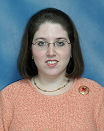Knowledge is Power - Know your Risk!
by Jodi D. Hoffman, MD, Tufts-New England Medical Center, Division of GeneticsDirector of the Victor Outreach and Screening Program for Ashkenazi Jewish
Genetic Diseases
 Nobody is perfect. Did you know that each of us carries six to eight gene mutations? Occasionally, we know this due to personal medical problems or a family history of a heritable condition, but for the most part, none of us know which six to eight mutations we carry.
Nobody is perfect. Did you know that each of us carries six to eight gene mutations? Occasionally, we know this due to personal medical problems or a family history of a heritable condition, but for the most part, none of us know which six to eight mutations we carry.
Let's review the basics. We all have 46 chromosomes, which come in pairs. We inherit half of our chromosomes from each of our parents. Each chromosome contains an average of 1500 genes. These genes are the coding units for the blueprints of our bodies. The code is made up of a specific sequence of units symbolized A, C, G, and T. If any one unit (in a critical position) changes, the code no longer allows proper processing of signals and proteins in the body.
Occasionally, when a change in a single gene is passed on from only one parent, we present with a disease such as hypercholesterolemia or Marfan syndrome. These diseases are called autosomal dominant conditions (only one copy of an abnormal gene is needed to cause disease).
More frequently, if we have one working copy of a gene and one gene with a mutation, we are healthy and do not know that we are carriers of a gene change. It is only when we partner with another carrier for the same disease that we are at 25% (1 in 4) risk of having a child with an inherited genetic condition with each pregnancy. These diseases are called autosomal recessive conditions (two copies of an abnormal gene are needed to produce a medical problem).
What diseases are we talking about? Well, it depends on where your ancestors came from. Although people from all backgrounds can have almost any disease, the likelihood of certain diseases is higher in different ethnic groups due to those people sharing common ancestry.
People from the Mediterranean area at increased risk for several types of thalassemias, blood conditions with cause anemia (low blood levels) and possible heart disease. People from Africa are at risk for sickle cell anemia. This disease makes blood circulation and oxygen delivery difficult, resulting in painful crises. Caucasian people, especially those from Northern Europe, are at increased risk for cystic fibrosis, a disease of the lungs and pancreas, often resulting in multiple hospitalizations and decreased life span. People from French Canada, Cajuns, Irish, and Ashkenazi Jewish people are at increased risk for Tay-Sachs, a neurodegenerative disease that usually results in death by 4-6 years of age.
Knowing that we all carry several genes that could result in serious diseases in our children can be somewhat overwhelming. So, what can we do? Many health care practitioners are available to counsel and screen for these disorders. Specifically, geneticists, genetic counselors, maternal fetal medicine specialists, and obstetricians can provide information regarding your personal risk based on your ancestry and your family s medical history.
What if my partner and I find out we are both carriers for a genetic disease? Again, the specialists listed above are available to discuss reproductive options such as prenatal diagnosis, egg or sperm donation, adoption, or in vitro fertilization with prenatal genetic diagnosis. All of these techniques assist you and your partner in having a healthy child together.
It may be scary to confront your genetic risks, but only you can take the first step toward allowing yourself to make educated reproductive decisions. Please take the first step and ask your health care provider how you can proceed. Knowledge is power!
About Tufts New England Medical Center and the Floating Hospital for Children:
Tufts-New England Medical Center is a world-class academic medical institution that is home to both a full-service hospital for adults and the Floating Hospital for Children. It has long been recognized as a leader in cancer care, cardiology, organ transplantation, neurosciences and pediatrics. Founded in 1796 as the Boston Dispensary to care for sick and needy Bostonians, Tufts-NEMC is the oldest health care facility in New England. The Medical Center is the principal teaching hospital for Tufts University School of Medicine. The Floating Hospital for Children, Tufts-NEMC's full-service children's hospital, began as a hospital ship more than a century ago. The 128-bed Floating Hospital provides comprehensive inpatient and outpatient services in every area of medical specialization. The Genetics Division's Family Center for Genetic Medicine offers counseling, screening, and treatment for genetic diseases at the Medical Center's adult and pediatric hospitals, providing coordination and continuity of care for all family members -- pre-conception, prenatal, newborn, child, adolescent, and adult. The Victor Outreach and Screening Program for Ashkenazi Jewish Genetic Diseases at Tufts-NEMC offers comprehensive genetic counseling, screening, and reproductive planning for genetic diseases that occur with increased frequency among people of Eastern European Jewish descent.
For more information on Tufts-NEMC access our web site, https://www.tuftsmedicalcenter.org/ .
Herb's Tips and More
-
 Did you know that you can make soap, candles and lotion with your herbs?
Did you know that you can make soap, candles and lotion with your herbs? -
 Never take any herb identity for granted. The best way to be sure that you are using the right kind of herb is by buying it.
Never take any herb identity for granted. The best way to be sure that you are using the right kind of herb is by buying it. -
 Excellent health articles whether you are looking for information or inspiration regarding preventive health or are dealing with a medical
challenge.
Excellent health articles whether you are looking for information or inspiration regarding preventive health or are dealing with a medical
challenge.









